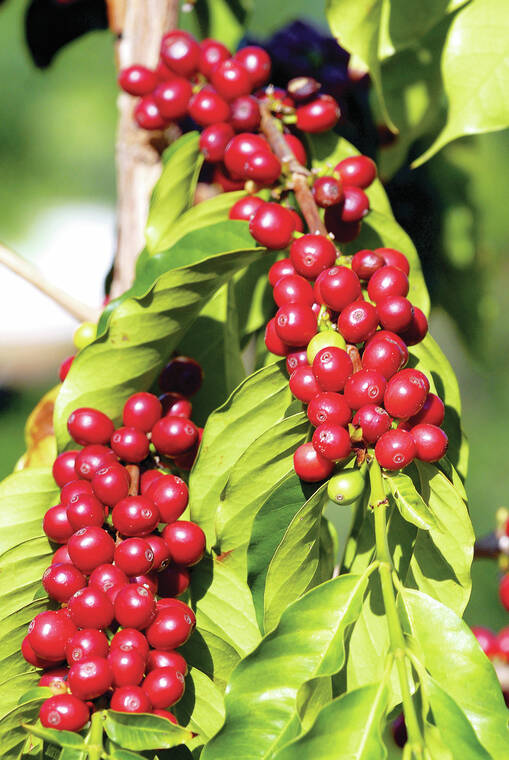Gov. Josh Green on Wednesday signed two coffee bills into law — one aimed at labeling practices for coffee crops originating in Hawaii and the other that will expand the fight against blights affecting the iconic crop.
SB746 expands coffee labeling and advertising requirements to include ready-to-drink coffee beverages and the inner packages and inner wrapping labels of roasted coffee, instant coffee and ready-to-drink coffee beverages. It specifies that the coffee labeling and advertising requirements apply if the applicable products are produced in whole or in part from Hawaii-grown and Hawaii-processed green coffee beans. It additionally requires disclosure on the label of coffee blends of the respective geographic and regional origins and percent by weight of the blended coffees and prohibits use of the term “All Hawaiian” in labeling or advertising for roasted coffee or instant coffee not produced entirely from green coffee beans grown and processed in Hawaii.
The Legislature found that for more than 30 years, Hawaii has been the only region in the world that statutorily regulates the uses of its geographic names, such as “Kona,” “Maui,” and “Ka‘u,” on labels of its specialty agricultural products but required that only 10% of the product originate in the geographic area indicated. The Legislature further found that this low percentage requirement directly damaged and degraded the reputation of world-famous Hawaii-grown coffees and damaged the economic interests of Hawaii coffee farmers.
“As a long-time certified organic farmer, accurate records and truth in labelling are always required; this legislation helps inform consumers of what our products contain, which is good for Hawaii, for the coffee industry, and for all consumers. Many thanks to legislators and the Governor for supporting and endorsing this important step forward to honestly represent Hawaii coffee,” said Colehour Bondera, owner of Kanalani Ohana farms in Honaunau.
The Legislature also found that more than 90% of Hawaii’s coffee farms are located on the island of Hawaii.
In 2014, the Hawaii County Council adopted Resolution No. 501 14, entitled “Requesting the Hawaii Legislature to Adopt Provisions for Truth-In-Labeling for Hawaii-Grown Coffees.” The council’s request to the Legislature was based on several findings, including existing labeling requirements for Kona coffee causes consumer fraud and degrades the “Kona coffee” name; and confusion as to the difference between Kona coffee and Kona coffee blends caused Consumer Reports magazine to rate Kona coffee as “second rate.”
According to the legislation, the label on the package of a 10% Hawaii coffee blend does not advise consumers that 90% of the coffee in the package is imported, foreign-grown, or a mixture of multiple Hawaiian regions and foreign-grown coffee and is inherently deceptive to consumers, who are often erroneously led to believe that a package of coffee blend contains a blend of coffees only from farms in Kona or other regions in Hawaii.
In addition, the governor signed bill SB743 relating to coffee pests.
Coffee berry borer and coffee leaf rust have devastated Kona coffee crops in recent years.
The bill extends the sunset date for the Coffee Berry Borer and Coffee Leaf Rust Pesticide Subsidy Program to June 30, 2025, and the program manager position, including the position’s civil service and collective bargaining laws exemption, to June 30, 2026. It also appropriates funds for the operation and implementation of the pesticide subsidy program.
“The subsidy program was legislated to continue forth for an additional year. It was appropriated funding to do so, but not expanded to include fertilizer to strengthen the trees. Only one more year for the program, so the hope is to see legislation next year which extends the subsidy program for several additional years and includes fertilizer as a means to fight off pest concerns, through healthier trees,” said Bondera.



